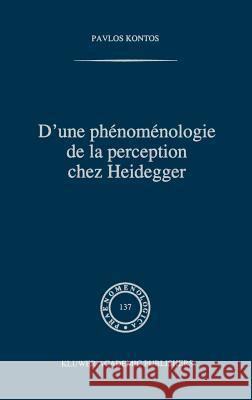D'Une Phénoménologie de la Perception Chez Heidegger » książka
D'Une Phénoménologie de la Perception Chez Heidegger
ISBN-13: 9780792337768 / Angielski / Twarda / 1996 / 212 str.
Ce travail ambitionne inaugurer la thematisation d'une phenomenologie de la perception chez Heidegger. En prenant le contre-pied de bien des interpretations recentes concernant de questions cruciales de l'ontologie heideggerienne, notamment celles de l'articulation temporelle du present et de la distinction entre Zuhandenheit et Vorhandenheit, il defend la these inattendue que la temporalite de la perception sert de fil conducteur de l'ontologie heideggerienne du temps, dans la mesure ou elle impose la scission de la temporalite en modes authentiques et modes inauthentiques.
Notre commentaire serre sur les textes de l'epoque de Marbourg fera apparaitre que l'opposition entre la temporalite authentique de la perception naturelle', identifiee positivement a la circonspection, et la temporalite inauthentique de la perception theorique' ne resume pas simplement la critique heideggerienne de Husserl, mais contribue, avant tout, a ouvrir un espace critique dans la problematique phenomenologique de la perception dans son evolution de Husserl jusqu'a Merleau-Ponty.
This book claims to inaugurate the thematization of a phenomenology of perception in Heidegger. Running counter to many recent interpretations concerning crucial questions of Heideggerian ontology (particularly the temporal articulation of present and the distinction between Zuhandenheit and Vorhandenheit), it defends the unexpected thesis that the temporality of perception serves as a conductor of the Heideggerian ontology of time, by splitting temporality into authentic and unauthentic modes.
Concise commentary on the texts of the Marburg period show that the opposition between the authentic temporality of natural' perception (positively identified as circumspection) and the unauthentic temporality of theoretical' perception does not merely summarize the entire Heideggerian critique of Husserl but, above all, helps to open a decisive path in the phenomenological account of perception in its evolution from Husserl to Merleau-Ponty.











